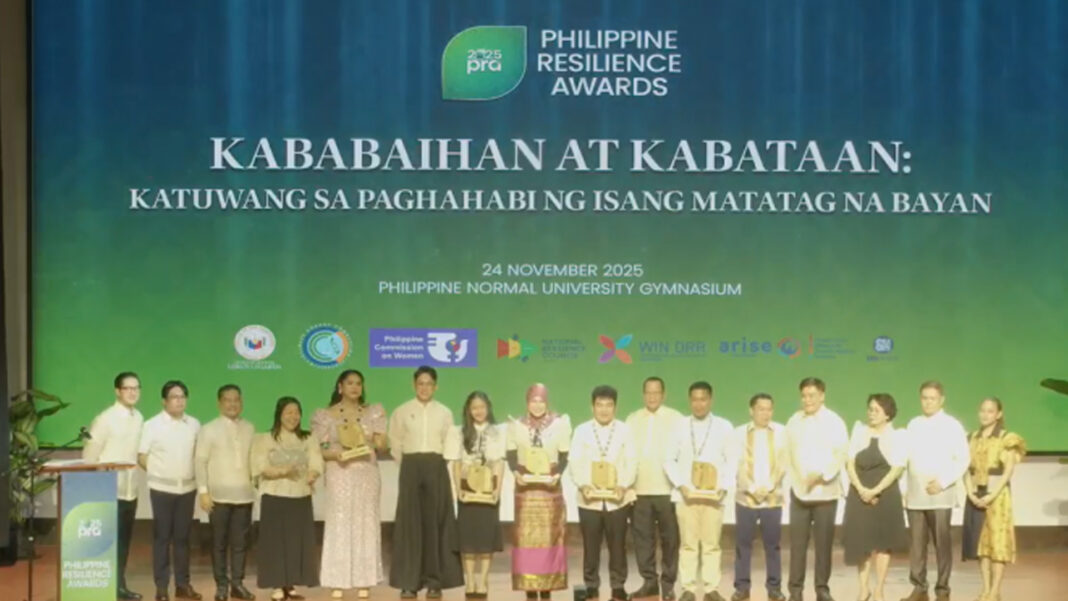The Climate Change Commission (CCC) honored exceptional women and youth leaders advancing local climate action during the 2025 Philippine Resilience Awards (PRA) on Monday.
In his speech, CCC Vice Chairperson and Executive Director Robert E.A. Borje said community-grounded leadership is central to building national resilience, noting the “true test of resilience is not how often we rebuild, but how rarely we are broken”.
He described the honorees as central to the country’s climate response: “They are the micro-entrepreneurs, scientists, custodians of traditional knowledge, and community organizers who prove that women and youth are not on the sidelines of climate action —they are at the heart of it.”
Borje called for a shift from reactive recovery to proactive protection and urged partners to expand community-driven innovations, noting that isolated “islands of success” are not enough for an archipelagic nation facing escalating climate threats.
Among the women awardees were Dr. Diana Rose Cajipe for “Buong Bansa Handa,” Jenelyn Salimbagat for her Family Emergency and Disaster Preparedness Plan, and Renebelita Fuentebella for “Damit Dignidad Pilipinas.”
Five youth champions were likewise recognized: Raymart Garcia for the Reskyusi Food Basket Program, Shri Tahanie Macaumbao for Green by Design, Val Amiel Vestil for “Kwentong Kalikasan,” Peter John Enorio for his Subang Environmental Initiatives, and Christian Hernandez for Project MOSES.
Borje underscored that resilience is built on science, purpose, planning, and action —not sentiment—and affirmed the CCC’s commitment to scaling successful community models nationwide.
“Masakit man na nagkakaroon tayo ng losses and damages, but hindi pwedeng mapako tayo sa (It is painful that we are suffering losses and damages, but we cannot be nailed to the) losses and damages. We do have to transform into something more resilient. And we can only do that if we keep on doing our part, not just today, not just within our communities, but beyond,” Borje said.
Roving climate change academy
Meanwhile, Senator Loren Legarda emphasized the need for climate resilience to be both systemic and community-rooted, urging CCC to combine national reforms with on-the-ground capacity building.
She made the call while pushing for the establishment of a roving climate change academy during the awarding.
Legarda cited recent disasters, including Typhoon Tino and Super Typhoons Nando and Uwan, as examples of how national policies can fall short when information and preparedness fail to reach the most vulnerable communities.
She stressed that resilience should not be seasonal or limited to typhoon periods but should be practiced consistently throughout the year.
The senator highlighted the importance of simplifying information and ensuring that people understand government policies.
She urged local governments to integrate resilience into their core development agenda.
Legarda also called for the restoration of wetlands and the protection of both declared and yet-to-be-declared protected areas.
She emphasized improving early warning systems to ensure that alerts are understandable and actionable for all, noting that technical or language barriers often prevent effective communication during disasters.
She concluded that systemic climate resilience requires stronger ecosystems, effective law enforcement, and informed citizens.
“If people die because information never reaches them, then that is a systemic failure,” Legarda said, urging officials to engage directly with communities, simplify messaging, and amend policies where gaps exist. (PNA)


